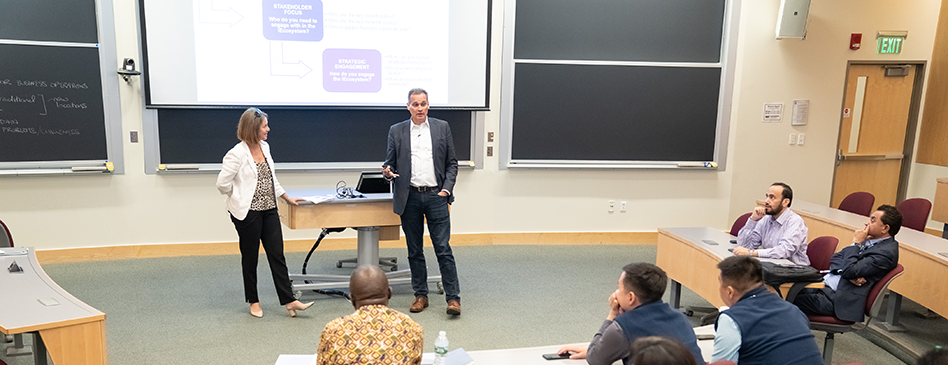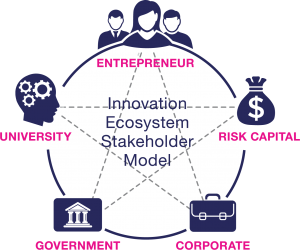15.364 Innovation Ecosystems (iEcosystems) for Regional Entrepreneurship-Acceleration Leaders (4REAL)
As part of MIT Sloan’s ‘Entrepreneurship and Innovation’ (E&I) Track, this class uniquely takes an ‘ecosystem’ perspective, in line with MIT’s ‘systems thinking’ approach. This means acknowledging the role of multiple stakeholders (as below) – alongside ‘innovation-driven entrepreneurs’ – in the building of innovation ecosystems that are sustainable and inclusive, on a diverse set of dimensions.
Whether you see yourself as such an entrepreneur or will play another key role in the innovation economy, this class equips you with an MIT approach to innovation that has proven useful in the real-world over the last 10 years (as also taught in our global MIT REAP – Regional Entrepreneurship Acceleration Program. Ready for the Spring of 2022, we are adapting our course – with the help of our TA, Mahreen Khan – to reflect today’s global challenges, especially the ‘new normal’ of post-lockdown societies and economies.
Building on our action-oriented approach, we also want participating students – from MIT and beyond – to be able to use the class to create actionable plans. You can shape your final assignment to be a plan for your next job, a pitch to an organization, or a call to action for a community. By the last week of the class (ie 10 May), we hope that some of you will share your final assignments publicly, so as to encourage and inspire others.
Now is a time to consciously build ‘inclusion’ into the innovation ecosystems we care about, especially as they will be key to helping our regional economies in 2022. Let’s make sure this recovery is more inclusive than the one a decade ago, the one that left people and places behind.
So, whether you wish to focus on Roxbury or Rwanda, Greater Boston or Great Britain (or you just don’t know yet!), we hope you will consider joining us in our iEco4REAL class in the Spring.
Innovation Ecosystems (iEco) for Regional Entrepreneurship-Acceleration Leaders (4REAL) is a practical MIT course aimed at students wishing for a research-based but action-oriented understanding of how to accelerate innovation-driven entrepreneurship and build vibrant regional economies. It takes as its starting point the innovation-driven entrepreneurship ecosystems (iEcosystems) that have served as the foundation of many successful regions since the first industrial revolution, and now characterize places such as Silicon Valley, Boston/Cambridge, London, Israel and Singapore.
The course takes the perspective of five critical stakeholders: entrepreneurs, risk capital providers, and universities, as well as policymakers (government) and large corporations. It provides frameworks for understanding the strengths and weaknesses of innovation-driven entrepreneurship in particular regions, and then focuses on interventions – programs and policies – that can be designed and implemented across regional economies worldwide.
The course also takes a systematic approach to assessing the metrics of ‘innovation-driven entrepreneurship’ ecosystems (iEcosystems). Our recent Working Paper is published to seek feedback from researchers, practitioners, decision-makers, and students in our IEco4REAL class!
CLASS (re-)DESIGN
We aim to have a strongly interactive class (with more than our usual 30 students, as that’s what digital tech and hybrid teaching allow!) that meets once a week. There will be readings for each session and students will be expected to be prepared to make insightful and thoughtful contributions to class discussions.
Class sessions have traditionally taken three different forms:
- Focus on different approaches to entrepreneurial acceleration e.g. Porter’s cluster approach versus Feld’s entrepreneurs approach.
- Case studies of different regions – either individual regions or as a paired comparison.
- Analyses of specific programs and practices with examples e.g. design of accelerators
This Spring, we will go beyond the following three, to allow more time for outside speakers, and student presentations.
The course is open to students from across the MIT community and beyond. It is likely to be of particular interest to students from MIT Sloan (especially MBAs, Sloan Fellows and EMBAs), DUSP and the wider MIT community; as well as Harvard’s Kennedy School of Government (HKS) and School of Business (HBS), as well as Wellesley College, Boston University, Tufts, etc. Students in MIT’s TPP, EMBA, MBA, and SF programs will find this of particular interest. We believe that students engaged in the Legatum Center, D-Lab and IDEA Challenge will also be valuable contributors to this course. Remote class participation is possible, especially to accommodate EMBAs.
Students from a diverse variety of different backgrounds and perspectives will benefit from the class.
SCHEDULE
- Tuesdays in Spring, 5:30–8:30 pm
FACULTY
- Dr. Phil Budden
Senior Lecturer, Technological Innovation, Entrepreneurship, and Strategic Management
MIT Sloan School of Management - Professor Fiona Murray, MIT Sloan School of Management
Director, MIT Innovation Initiative, Associate Dean for Innovation and Inclusion
QUESTIONS?
- Contact TA: Mahreen Khan (mahreen@mit.edu)


